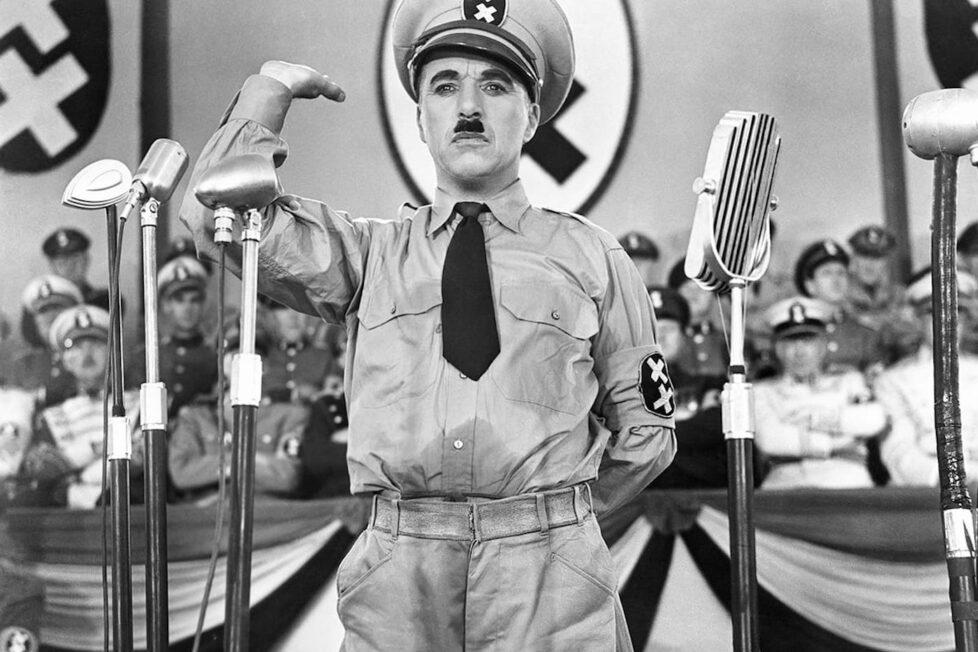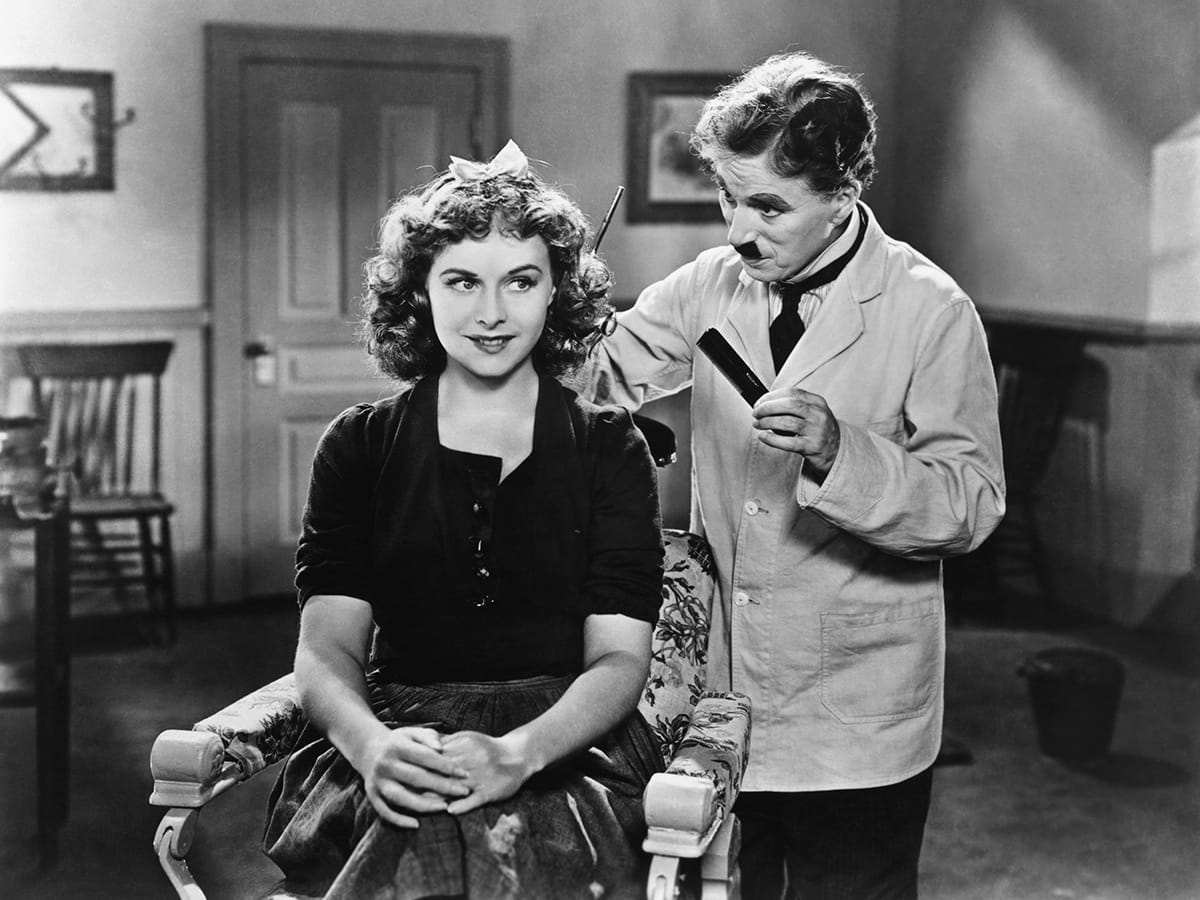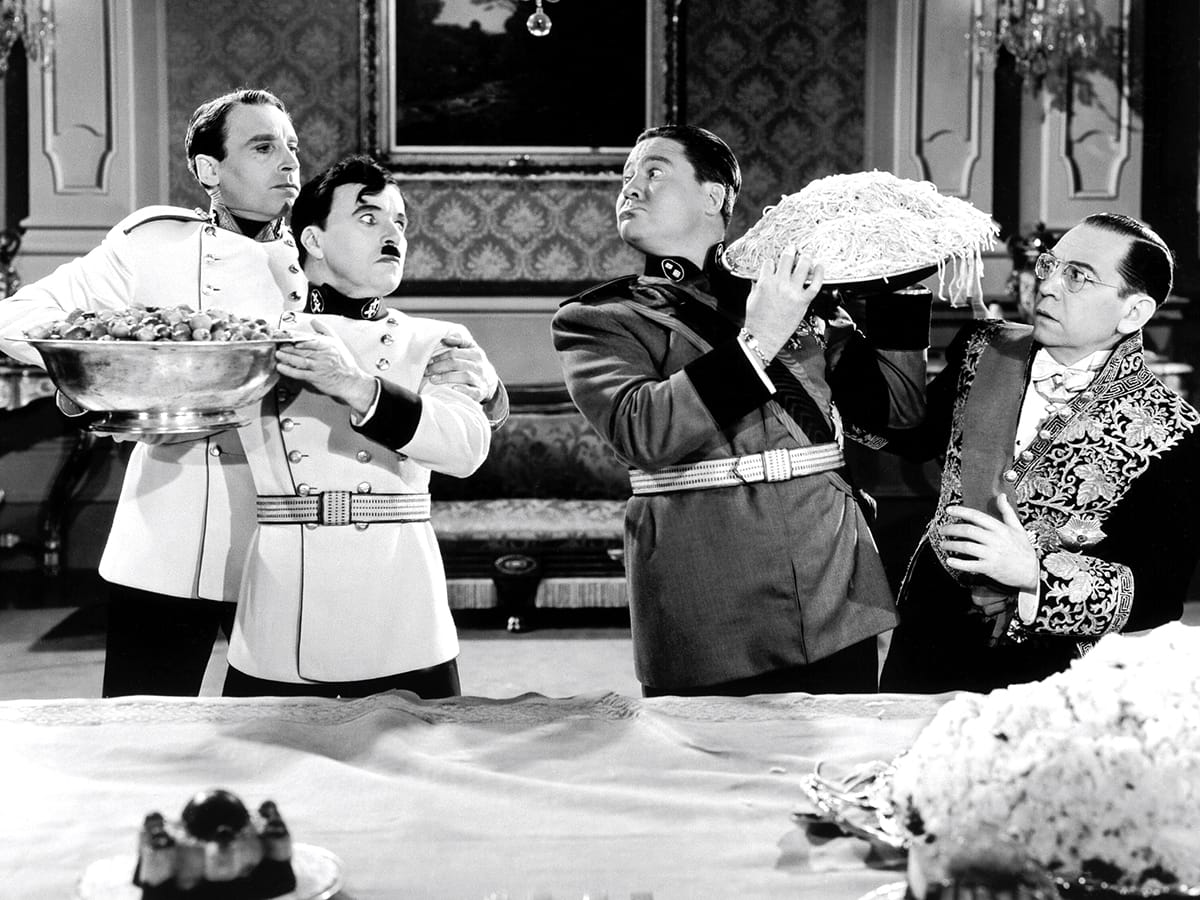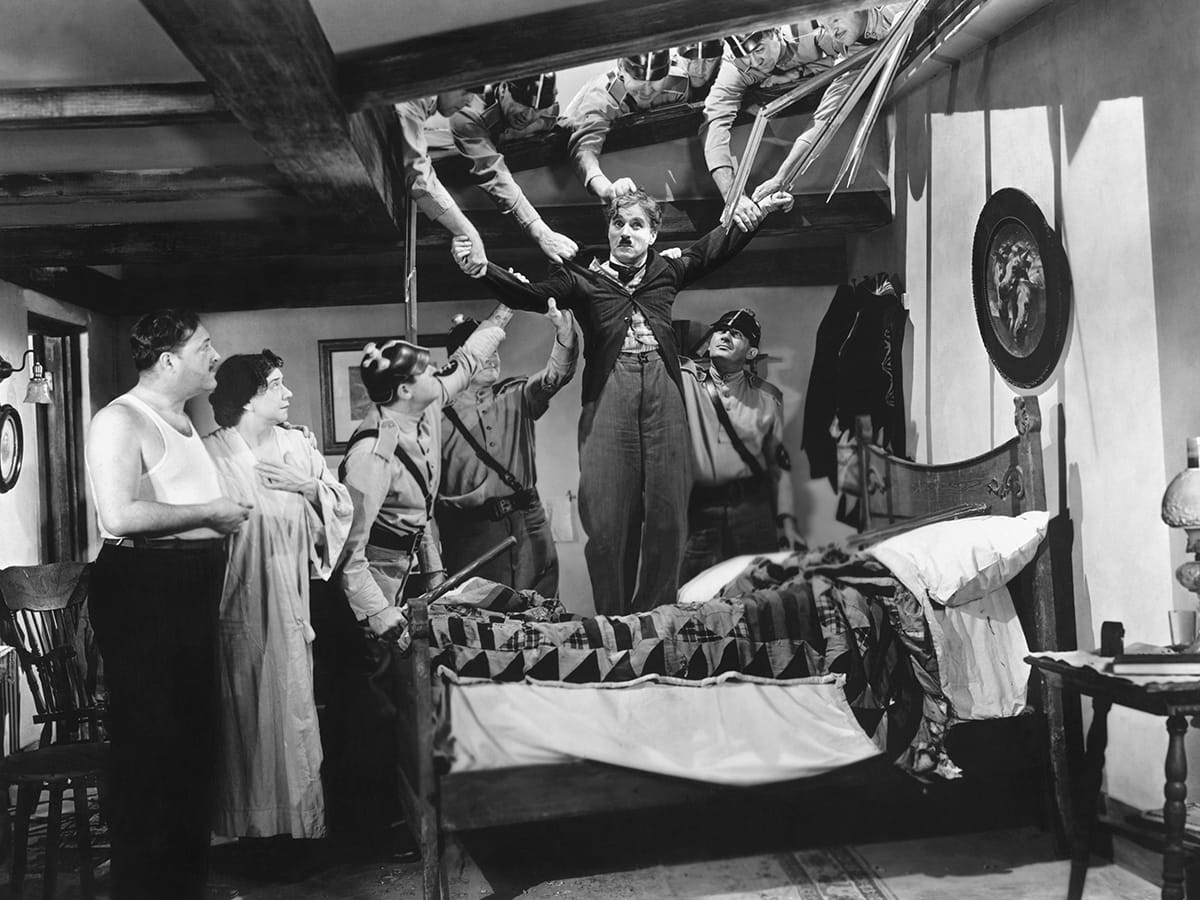THE GREAT DICTATOR (1940)
Dictator Adenoid Hynkel tries to expand his empire while a poor Jewish barber tries to avoid persecution from Hynkel's regime.

Dictator Adenoid Hynkel tries to expand his empire while a poor Jewish barber tries to avoid persecution from Hynkel's regime.


As with so many silent or silent-ish comedies, many of the best gags in Charlie Chaplin’s The Great Dictator are visible a mile off. When a waiter at a grand party held for Adenoid Hynkel (a thinly-disguised Hitler, played by Chaplin) and Benzino Napaloni (Mussolini, played by Jack Oakie) spoons out English mustard into a receptacle next to the whipped cream, you just know that sooner or later one or the other is going to end up with mustard on their strawberries.
But part of Chaplin’s genius lay in playing to the audience’s expectation while simultaneously going beyond it in a surprising way. Thus, it’s not only Hynkel, having accidentally helped himself to mustard instead of cream, who starts writhing around with a mouth on fire, it’s also Napaloni, who intended to put mustard on his sandwich but still didn’t realise how hot it would be. Perhaps the dig here is at Napaloni’s big-man act, and that would certainly be in keeping with a film that takes such delight in mocking two of the best-known public figures in the world at the time (think Trump and Putin, say).
The whole film, indeed, is a giant gag that goes in an unexpected direction. Chaplin plays not only Hynkel but also an unnamed Jewish barber (strongly recalling his familiar Tramp character), and, of course, throughout we’re expecting them to swap places, but the way in which it finally happens—the narrative groundwork carefully and unobtrusively laid—isn’t what one might anticipate.
The Great Dictator was Chaplin’s first fully-fledged dialogue film, and the first movie he completely wrote before shooting. Although an expensive production, it was also one of his biggest successes, both commercially and critically (and the only one to receive a ‘Best Picture’ nomination at the Academy Awards, losing out to Hitchcock’s Rebecca). As in much of his work, serious and humanist points aren’t far below the often broad humour on the surface, and occasionally are made explicitly.
Consider the two title cards early on, for example. The first reads that “any resemblance between Hynkel the dictator and the Jewish barber is purely co-incidental (sic)”—something the audience was expected to recognise as tongue-in-cheek, since the similarity of Chaplin to the German dictator was well-known and, indeed, some people (including Chaplin himself) believed Hitler’s moustache was actually an imitation of the movie star’s own.
The next card, though, more frankly signals what Chaplin thinks of his subject, stating that the film will be set in “a period between two World Wars—an interim which Insanity cut loose, Liberty took a nose dive, and Humanity was kicked around somewhat”. Before the movie had even started, then, audiences would be left in no doubt about its stance.

It’s sometimes overlooked, however, that while Hynkel is a larger presence than the Jewish barber (or at least gets more of the most memorable scenes), The Great Dictator actually begins implicitly long before Hynkel’s rise to power.
In the last days of the Great War, we meet the barber as a hapless private soldier in the Tomainian (German) army under the command of General Schmelloffel (try saying it aloud). We see him struggling with a giant artillery piece, rescuing a wounded airman, and then wondering why gravity has gone into reverse when the tiny fighter plane they’re in is, in fact, flying upside-down.
This section of the film is largely an excuse for visual humour and—although it might also be teasing those aware that Hitler had served in the First World War, leaving them unsure which character they were watching—its main narrative function is to provide a pretext for the barber to lose his memory and spend the next two decades in hospital.
Thus, when he awakens in the later 1930s to a fascist regime led by Hynkel as Phooey (Führer) and marked by the sign of the double cross (the swastika), he’s initially unaware anything has changed and even challenges the stormtroopers who rampage through the Jewish ghetto. The barber’s active opposition to the fascists remains largely inadvertent—he’s only really interested in cutting hair and in his blossoming romance with Hannah (Paulette Goddard)—but despite his comic misadventures, he’s a likeable and even admirable human being.
Hynkel, by contrast, is a joke, and so are those who surround him—some of them German stereotypes, some based on real figures, as indeed the design of Hynkel’s office was based on Hitler’s own. Herring (Billy Gilbert), the Minister of War, is Hermann Göring; Garbitsch (Henry Daniell), the Minister of the Interior, is Joseph Goebbels.
While neither actor is a lookalike, both bear enough resemblance to their real-life models to ensure audiences don’t miss the point. And Herring, in particular, is the butt of relentless lampooning. His repeated proud announcements of game-changing military inventions which invariably malfunction (a parachute hat, a bulletproof uniform) interestingly foreshadow the Nazis’ attempts much later in WWII to reverse their fortunes with new weapons.
Even more recognisable than Herring/Göring is Oakie’s Napaloni/Mussolini, dictator of Bacteria, who arrives on a state visit and effortlessly upstages the irritated Hynkel again and again. Even so, his only function in the film is as a foil for Hynkel, and it is the barber rather than the fellow dictator who is Hynkel’s real mirror image.

Chaplin’s dual role makes this obvious, naturally, but it’s also underscored by the alternation of their stories and by the adjacency of two balletic sequences: the famous and beautifully, delicately choreographed one where Hynkel dances with a giant globe, dreaming of world domination, and another where the barber shaves a customer in time with a Brahms Hungarian Dance.
The customer in that scene is played by Chester Conklin, a collaborator of Chaplin in the silent days and one of several names in the credits who would have been familiar to audiences at the time, even if they are little-known now. But although there are some decent supporting performances—notably from Maurice Moscovich, a well-established actor on the Yiddish stage for whom The Great Dictator came at the end of a brief screen career—-it’s completely Chaplin’s film.
Other individuals are parodised, but Chaplin himself is nearly always the centre of the slapstick, frequently involving one of his two characters being thwarted by inanimate objects. A giant artillery shell turns like a compass needle, following the Jewish barber and preventing him from approaching its other end; Hynkel trips on a flight of steps; Hyknel’s attempts to greet the arriving Napaloni at a railway station are stymied by the train moving back and forth. Nor are his problems always inanimate—not only does Hynkel find it frustratingly impossible to compete with Napaloni in casual assertiveness, he is soon also toppling under the weight of the portly Bacterian dictator’s wife (Grace Hayle) after diplomatically asking her to dance.
That kind of humour dates back to the silent era, of course. So do other scenes built entirely around timing and movement, such as the one where five men in the ghetto eat together at a table, each hoping not to find in their pudding the coin which will mean they have been chosen for a suicide mission.
But sound is crucial to The Great Dictator too (just as it was crucial to the rise of Hitler, as observed by Jeffrey Vance on one of the extras here), and among the film’s most marvellous passages are those where Chaplin improvises a kind of cod-German gibberish for Hynkel’s incendiary speeches.
Basing his delivery on footage of the real Hitler, Chaplin captures the Führer’s wildly vehement oratorical manner very convincingly (in fact one close-up of a Hynkel anti-Jewish tirade is genuinely frightening) and an extra dimension is added at times by a too-genteel voiceover translation: “His Excellency has just referred to the Jewish people,” the translator reports after a barrage of presumed antisemitic abuse.
WWII had just started when filming of The Great Dictator began, although the US wasn’t yet involved (and indeed wouldn’t declare war for another two years). Respecting American isolationist sentiment, Hollywood had largely kept criticism of the Nazis out of its products, and The Great Dictator was unusual not only in its unmistakable satire of the German leadership but also in implying that action was necessary: individuals can’t fight the regime alone, Hannah says at one point, but “we can lick ’em together”.

Hindsight does cast a new light on its portrayal of antisemitism. The concentration camp to which the barber’s sent is almost absurdly comfortable compared with the reality, for instance—but Chaplin was later to say that he wouldn’t have made the movie if he had known about the real extent of Nazi persecution (and indeed the systematised murder of the entire Jewish population hadn’t yet begun anyway).
More surprisingly, although this is surely down to ignorance or oversight than any deliberate excuse-making for Hitler, the character of Hynkel is presented as being less passionately antisemitic than his lackeys, and The Great Dictator implies it’s these aides rather than their leader who encourage the worst oppression. (“Get rid of the Jews first, then concentrate on the brunettes,” suggests Garbitsch.) Indeed, Hynkel only fully turns against the Jews when the financier Epstein denies Tomainia a loan to fund its invasion of a neighbour; it’s a tactical response to a slight, not a manifestation of deep-seated hatred.
This did little to endear the film to the Nazis, who naturally detested it (they also mistakenly maintained that Chaplin himself was a Jew), although Vance in his extra on this Blu-ray disc mentions evidence that Hitler may have watched it. Today, it can feel strange that the most notorious aspect of Nazism seems to be somewhat downplayed, but then The Great Dictator is a product of its time—and, for its time and place, it was of course outspokenly anti-Nazi. The omission is a minor historical oddity, not a problem.
Outside of its political and historical meaning, it’s a dazzling film in which almost nothing fails to work. The orchestral score by Meredith Wilson is perhaps a little humdrum, true, but then the film doesn’t need much beyond background accompaniment.
More awkwardly, the barber’s closing speech direct to the camera, a plea for kindness and humanity, is both strangely non-specific (more of a complaint about modern attitudes in general rather than fascism or the Nazis specifically) and too blatant a change of mood from satire to editorialising. Though the British Communist Party liked it enough to publish the text, it may be an example of Chaplin not fully understanding how to use speech in film.
Still, these are minor flaws. The Great Dictator helped to permanently create the idea of Hitler as an object of ridicule, as well as evil: its legacy is visible today from Jojo Rabbit (2019) to YouTube’s endless re-subtitled parodies based on footage from Downfall (2004).
The globe scene is a thing of beauty in itself, the story manages to be genuinely interesting (not always a given with physically-oriented comedy), and many of the Tomainian parody-characters are creations of chucklesome genius, above all Hynkel himself. Some will inevitably prefer Chaplin’s silent work, considering it purer, but The Great Dictator may be his masterpiece.
USA | 1940 | 125 MINUTES | 1.33:1 | COLOUR/B&W | ENGLISH • “TOMAINIAN”


writer & director: Charlie Chaplin.
starring: Charlie Chaplin, Jack Oakie, Reginald Gardiner, Henry Daniell, Billy Gilbert & Paulette Goddard.
